Presentation Script
- Introduction to the event;
- Experience influence;
- Key concepts;
- Engagement with diversity;
- Challenges and Strategy;
- Positive and Negative Emotions;
- How to deal with negative emotions;
- Steps to advance human rights and justice.
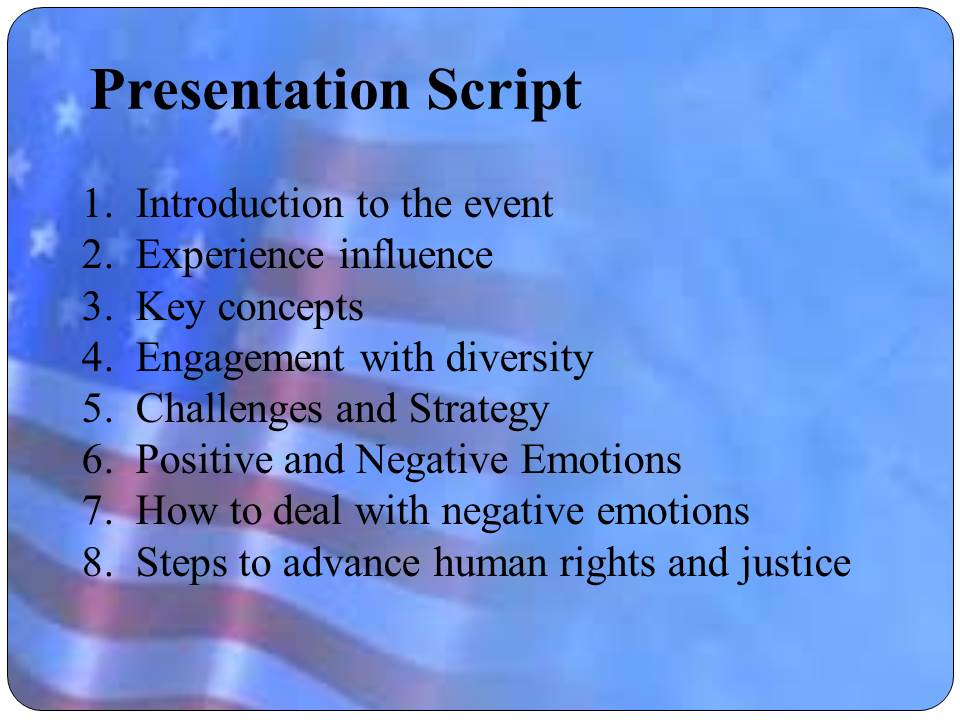
Introduction to the Event
- “Black Lives Matter” in the USA;
- Hillsborough, NJ made a statement on June 6, 2020;
- More than a thousand citizens joined a protest;
- The theme of racism cannot be ignored;
- The silence “spoke” that moment.
The “Black Lives Matter” movement continues to spread across the United States, provoking a number of positive and negative emotions. Many American states have already joined the idea to support racial equality in society. On June 6, 2020, the citizens of Hillsborough, New Jersey, organized a peaceful protest to demonstrate their solidarity. Despite the restrictions imposed by the COVID-19 situation, about a thousand citizens came to the intersection of Route 206 and Amwell Road, one of the busiest parts of the town, to discuss the theme of racism in the country. In addition to people’s stories and memories, a remarkable feature of this cultural event was the silence that lasted more than eight minutes.
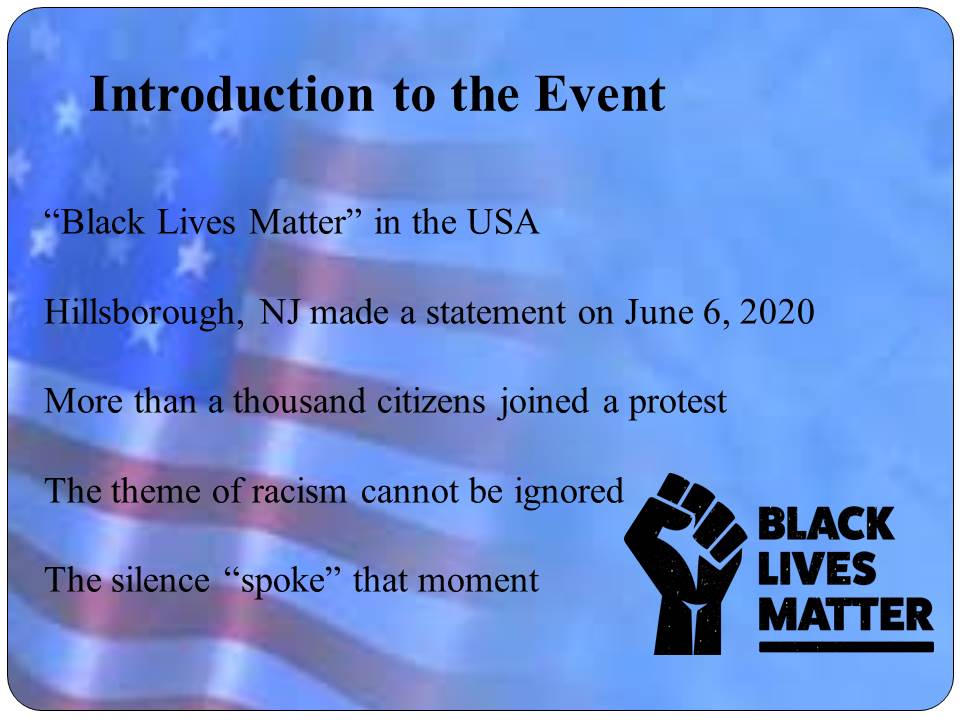
Experience Influence
- It is possible to change something;
- The effect of the crowd is impressive;
- Black people do not want to ask for help;
- White people experience fear because of prejudice;
- Nothing should be based on color.
Is it possible to change someone’s mind in several minutes? The experience obtained during the Hillsborough protest proves that everything is possible – to make the loudest street keep silence, to be heard by the globe, and to learn how unfair human judgments could be. It is enough to gather and exchange public experience. My perception of diversity and differences was never distorted, and I believed that equality is something people cannot be lost. I was wrong, and this cultural event in my community shows the real situation. Many black people are not able to ask for help because they have already lost hope. Many white people feel fear not because it exists, but because they are Americans, and it is their nature to be afraid of something. This event is an opportunity to prove that nothing should be based on color.
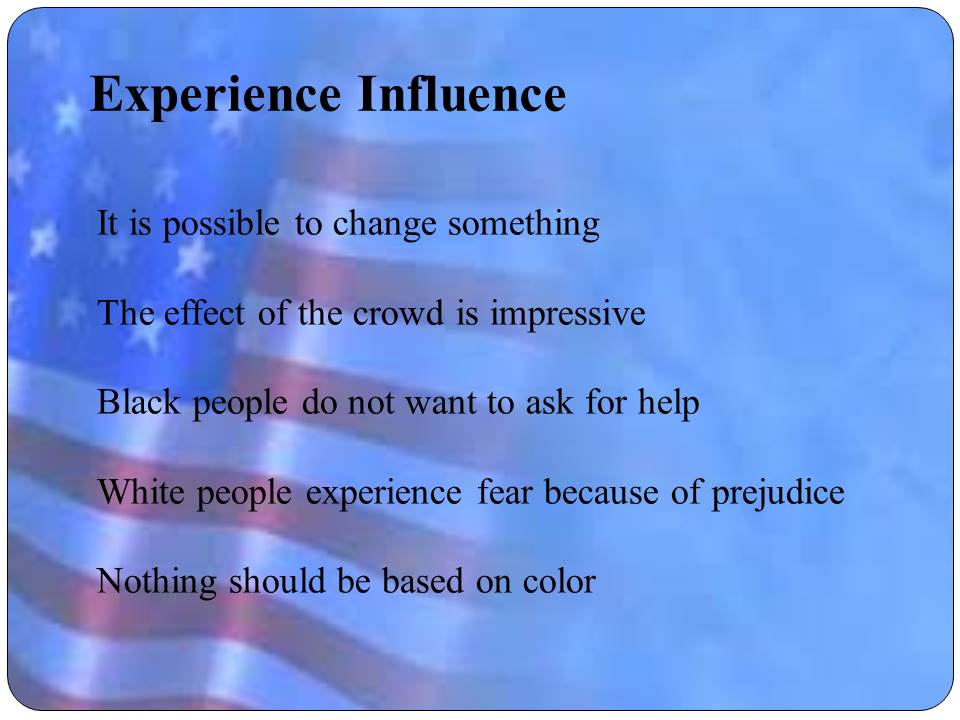
Key Concepts
Race
- Blacks are inferiors;
- “fear ruled everything around” (Coates, 2018, p. 134);
- Discrimination is a denial of equal access (Zastrow et al., 2019);
Gender
- Gender issues usually mean women’s issues (Katz, 2012);
- Male domination predetermine women’s and girls’ role in society;
- Sexism provokes new inequalities.
Class
- Class debates are “stripped from popular culture” (Mantsios, 2018, p. 173);
- Global comparison hides the American truth;
- Wealth and power are related.
After visiting the chosen cultural events, the worth of such concepts as “race,” “gender,” and “class” has been considerably re-evaluated. Although many American people believe that they live in an equal society, Blacks are still considered as inferiors. Coates (2018) uses the explanation that fear rules people, and racial discrimination exists as a form of denial in human relationships. Besides, the quality of life is determined by gender stereotypes that are usually identified as women’s issues (Katz, 2012; Zastrow et al., 2019). Because of male domination, people are not able to understand how women and girls are discriminated. Sexism provokes additional inequalities, and class diversity is one of them. Mantsios (2018) show that Americans avoid class debates because they believe that the USA offers its citizens better conditions, compared to developing countries. However, wealth and power give birth to the elite that dictates rules and diminish the poor.
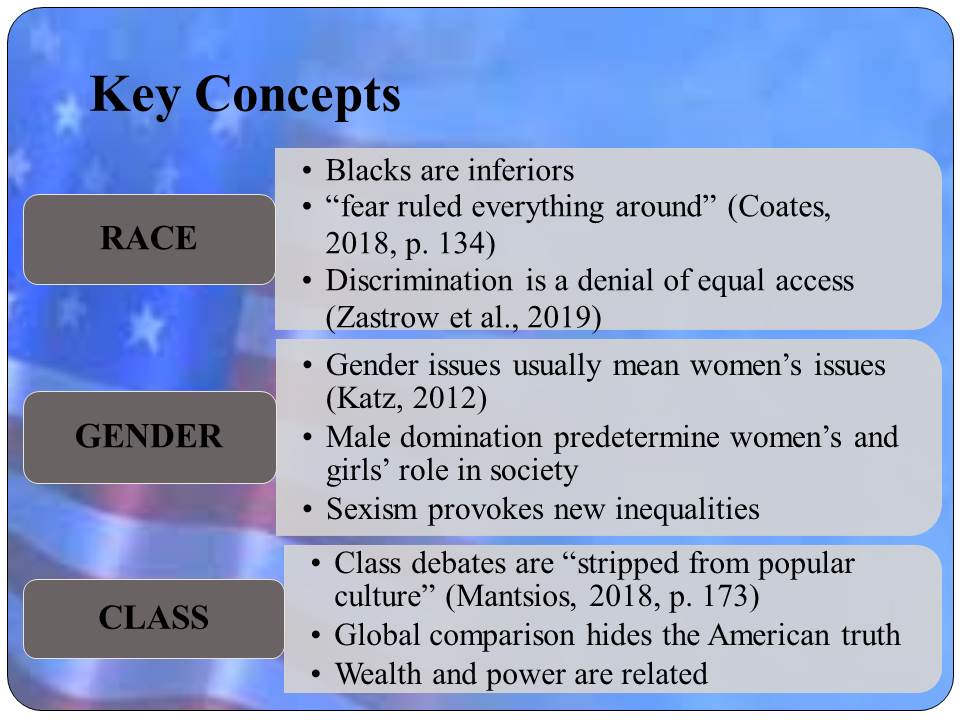
Engagement with Diversity
To engage with diversity means:
- to recognize differences in people;
- to respect differences that shape human experience;
- to communicate and learn;
- to participate in social events;
- to differentiate between privilege, power, and oppression.
Social workers have to cooperate with different people, regardless of their race, gender, or social class. Therefore, engagement with diversity and differences cannot be ignored or misunderstood. I consider this type of commitment as an opportunity to recognize and explain differences in people not to discriminate but to respect because it is the only way to respect human experiences and knowledge. History cannot be ignored, and individuals should be ready to communicate and learn, as well as to participate in social events. Such experience in social work practice will help to differentiate between privilege and power and never oppress minorities.
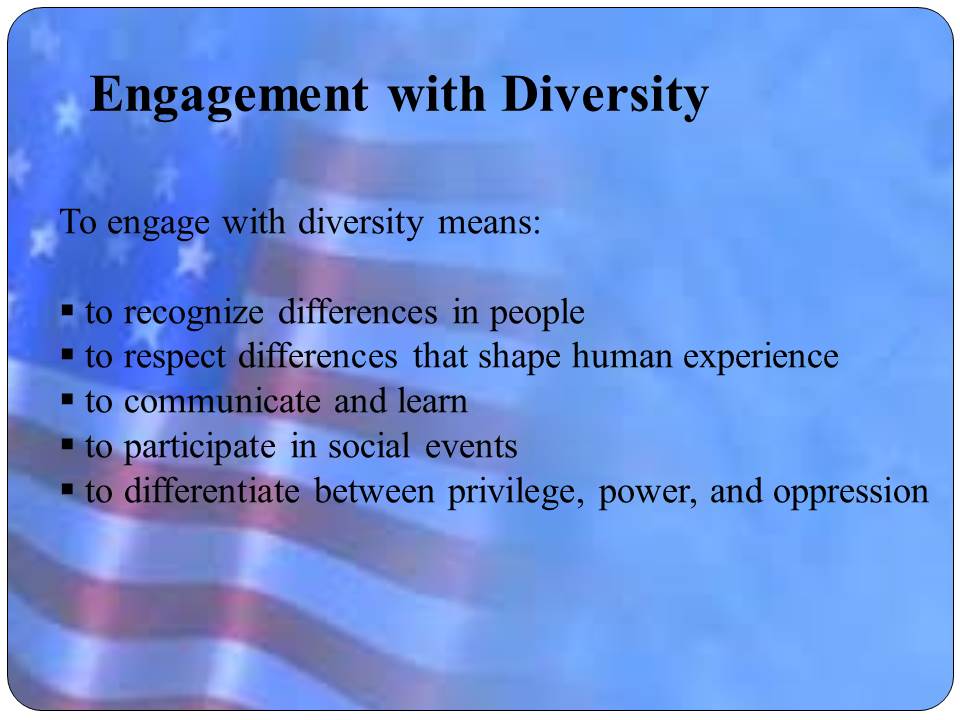
Challenges and Strategy
- Challenge One: the lack of effective communication (to be heard, people use protests and rebellions);
- Challenge Two: resistance to change (even if alternatives are offered, society does not want to believe in their power);
- Strategy: the promotion of clarity to avoid unnecessary judgments.
It is always easy to identify problems, shortages, and concerns in today’s style of life. People like to complain, but do not find it necessary to do something and promote positive changes. This course and social event experience help me identify two main challenges associated with diversity in society. First, there is an evident lack of effective communication between people. Even being aware of racial or gender inequalities and subjective stereotypes, it is hard for people to share their opinions. To be heard, it is necessary to organize a protest and an event, causing both negative and positive attitudes. Second, even if society recognizes a problem, many individuals do not act due to their resistance to change. If a problem does not touch their families directly, it is not necessary to change something. To address this challenge, the promotion of clarity is one of the possible strategies. This step will help to predict unnecessary judgments and inform people. Clear goals, intentions, and activities will demonstrate that society has to be changed.
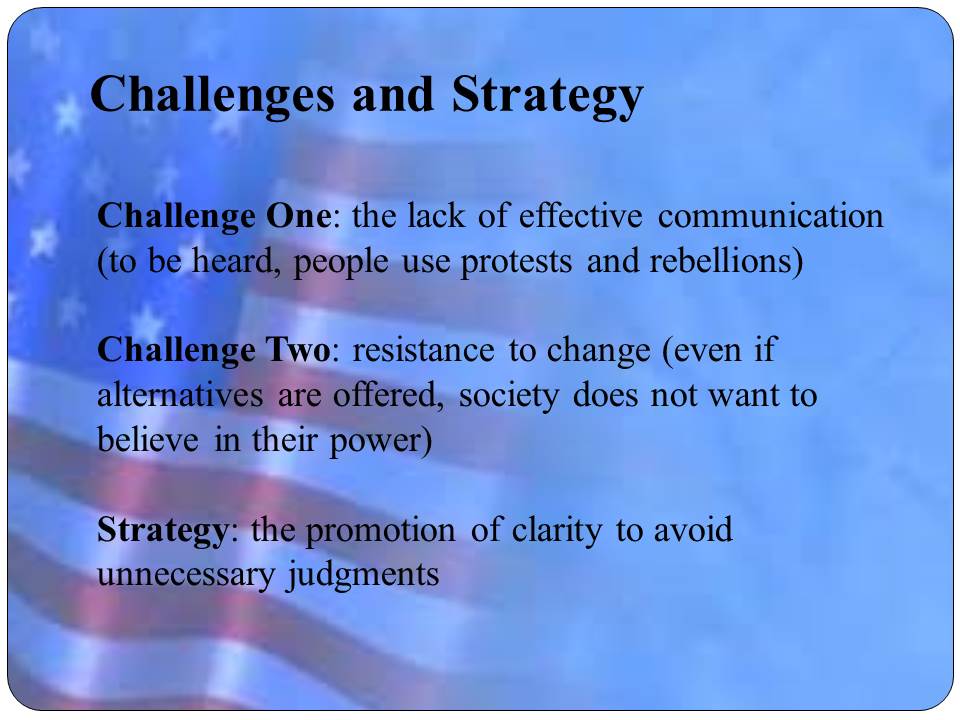
Positive and Negative Emotions
- Hope that people are interested in not only discussing diversity concerns but acting.
- Disappointment that many people continue living in anger and despair today.
During the past ten weeks of the course, I have got a number of opportunities to understand the quality and worth of human life from the social worker’s perspective. I believe that the American nation is one of the strongest countries in the whole world, and the growth of the “Black Lives Matter” movement serves as evidence. I am pleased with the fact that American students, teachers, as well as other citizens, are interested in solving the discrimination problem in society. There is a hope that something can be done to change this world, and people are ready to act. However, the analysis of the literature, communication with peers, and observations show that many Americans still live with the feeling of anger and despair that no help is coming. Some people are afraid to share their true attitudes toward the current situation and need additional motivation.
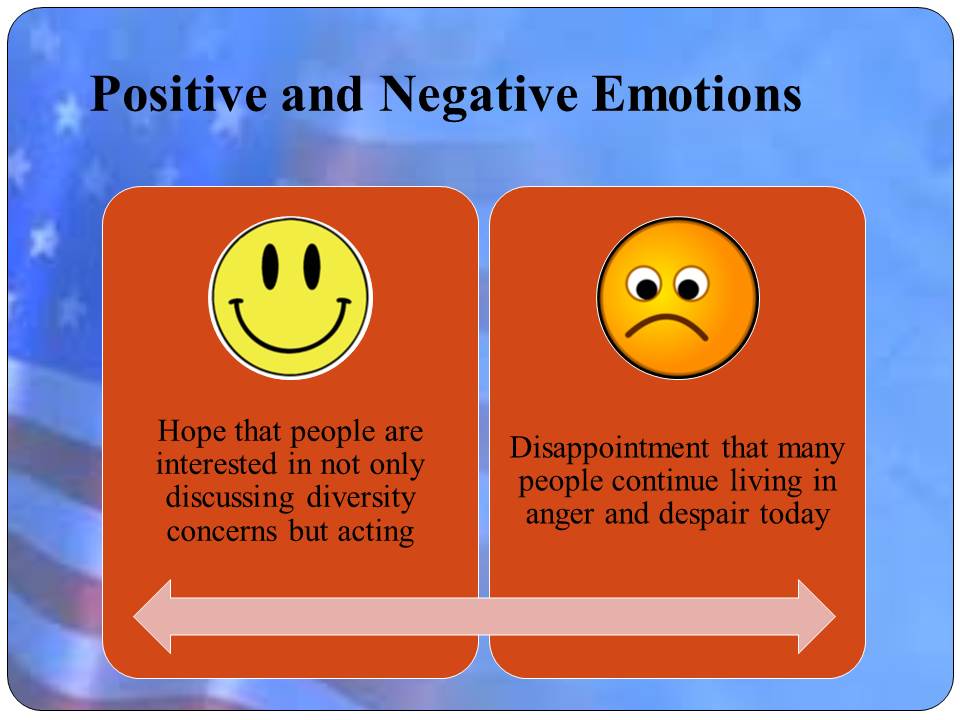
How to Deal with Negative Emotions
Collective thinking is the way to find a solution.
Despite the intention to create a perfect society and achieve the highest levels of life quality, negative emotions cannot be neglected. Instead of avoiding them or demonstrating anger, it is high time to find a solution. Regarding my experience and observations, I consider the idea of collective thinking as an appropriate strategy to address negative emotions. People are eager to communicate and cooperate, and there is a need for a good leader or even several leaders who could support collective thinking. As soon as citizens start discussing their emotions, memories, and experiences, they will be able to listen to and hear each other and make decisions.
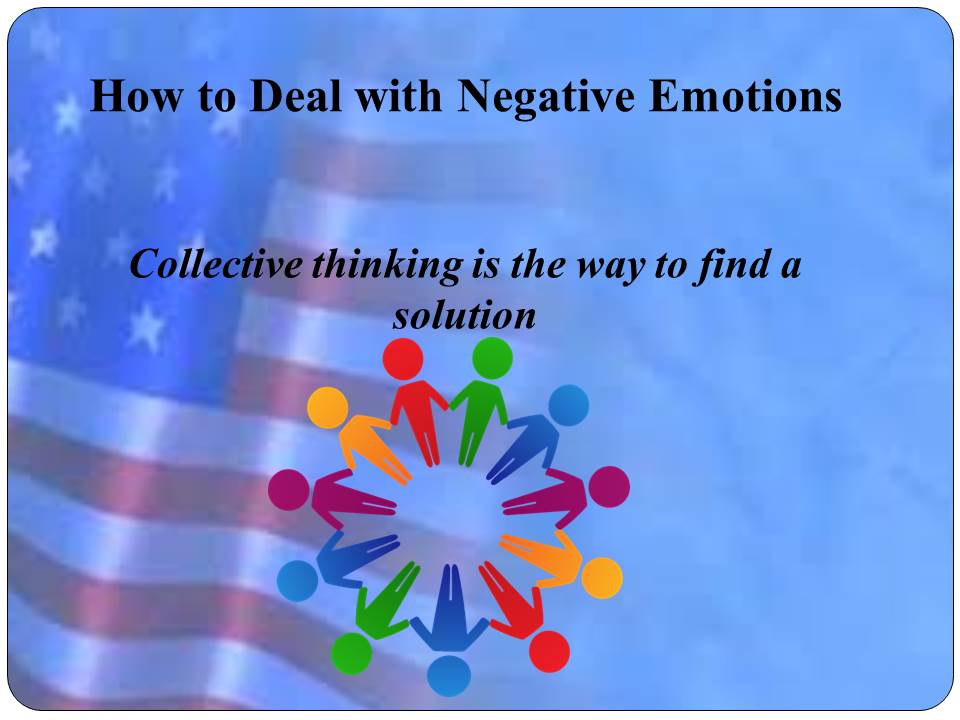
Steps to Advance Human Rights and Justice
- Participate in local social events;
- Communicate with people in social media;
- Visit local churches and public agencies;
- Learn theories, regulations, and political mechanisms;
- Invite new people to discussions.
My collective thinking strategy includes five main steps:
- I will continue visiting local public events to gather the opinions of people;
- I will talk to people of both genders and different races to learn their experiences;
- I will go to local churches and agencies to find emotional support and motivation;
- I will continue my education to be theoretically prepared for social work practice;
- I want to invite as many people as possible to contribute to the “Black Lives Matter” movement.
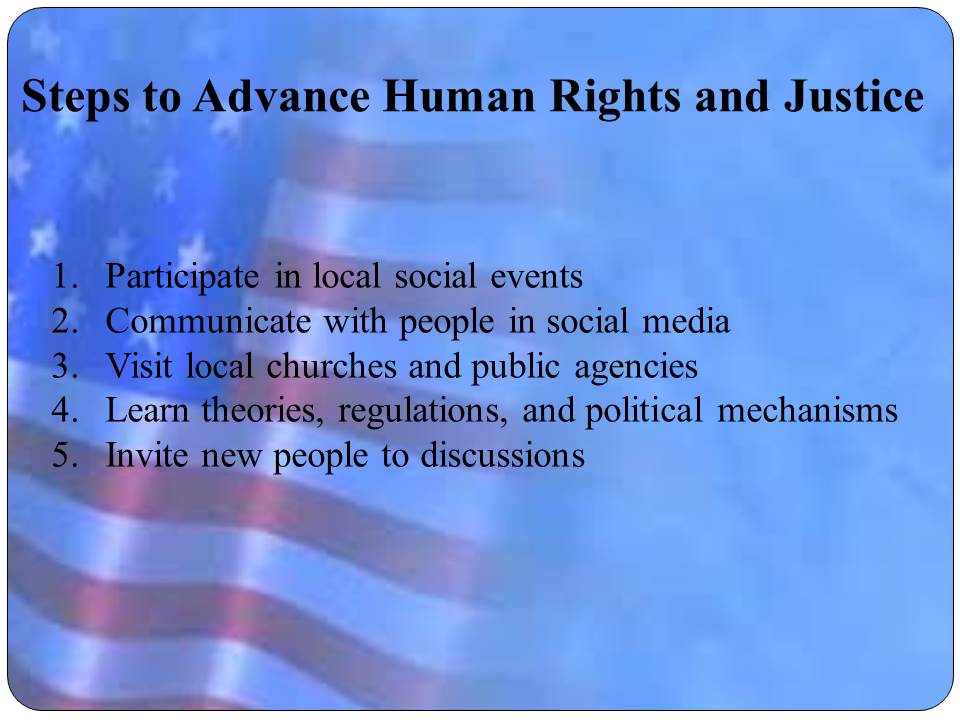
References
Coates, T. N. (2018). Letter to my son. In M. Adams, W. J. Blumenfeld, C. Castaneda, D. D. C. J. Catalano, K. DeJong, H. W. Hackman, & X. Zuniga (Eds.), Readings for diversity and social justice (4th ed.) (pp. 131-138). Routledge.
Katz, J. (2012). Violence against women – It’s a men’s issue [Video]. TED.
Mantsios, G. (2018). Class in America. In M. Adams, W. J. Blumenfeld, C. Castaneda, D. D. C. J. Catalano, K. DeJong, H. W. Hackman, & X. Zuniga (Eds.), Readings for diversity and social justice (4th ed.) (pp. 173-182). Routledge.
Zastrow, C. H., Kirst-Ashman, K. K., & Hessenauer, S. L. (2019). Understanding human behavior and the social environment (11th ed.). Cengage Learning.